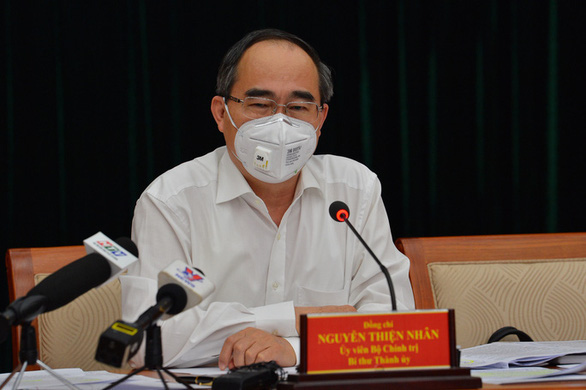The Ho Chi Minh City Party chief has discussed 'a new normal' in the fight against the novel coronavirus disease (COVID-19) pandemic, as Vietnam has achieved good results in its anti-epidemic efforts.
According to Nguyen Thien Nhan, secretary of the municipal Party Committee, the epidemic began in Vietnam on January 23, when two Chinese men were diagnosed with COVID-19 in Ho Chi Minh City.
The Southeast Asian country had a phase shift on March 29, Nhan continued.
A phase shift occurs when a country goes from having a daily increase in numbers of confirmed and active cases to reporting a decrease in the ratio of the number of active cases to the country’s tally.
The number of active cases in Vietnam had dropped from its peak at 163 — 86.7 percent of the national tally — to 65 by April 19, accounting for 24 percent of the country’s total, Nhan elaborated.
He classified Vietnam as a country with a 'mild' COVID-19 epidemic, adding that 38 out of 63 provinces and cities in Vietnam have not reported any case.
During the rest of 2020, Vietnam, as well as other countries that have had a phase shift in combating COVID-19, should have a plan to relax lockdown and social distancing rules and reopen schools, shops, and services in a suitable manner.
Codes of conduct and regulations must be established at businesses, agencies, and institutions to reduce the risk of an outbreak.
Until a vaccine is available, COVID-19 infection cannot be completely prevented, Nhan said, but it can be controlled like other infectious diseases.
‘A new normal’
Nhan highlighted aspects of 'a new normal' that Vietnam may have to adapt to in the upcoming period.
Wearing face masks should be made mandatory at schools, markets, on all forms of public transportation, and when one meets a person they have not seen after a certain amount of time (three months, six months, one year, or longer).
People arriving from COVID-19-hit regions must be tested for the virus. They will be quarantined for at least 14 days if they show symptoms of infection.
The screening may also be applied to people disembarking from planes and trains.
If a person is confirmed to be infected with COVID-19, all people having direct or indirect contact with the patient have to be isolated.
A minimum distance between people at production facilities, restaurants, and theaters, as well as in classrooms, trains, and cars should be promulgated.
The scale of some crowded activities such as cultural, sports, and tourism events should be limited.
People should practice washing their hands regularly, while all vehicles need to be sterilized periodically.
In order for 'the new normal' to work, all of the country’s sectors must coordinate properly and every citizen has to clearly understand the plan and strictly comply with regulations.
Secretary Nhan is expected to task all agencies and businesses with establishing suitable codes of conduct within April so that the rules can be applied from May.
As most of Vietnam’s trade and investment partners are still busy battling the pandemic, Nhan advised local businesses to focus on targeting the domestic market, as well as monitoring the situation in countries already going through a COVID-19 phase shift to prepare plans for investing in these markets.
According to the Party chief, Vietnam is completely capable of treating 1,000 COVID-19 patients simultaneously.
Even if the number of cases tops 2,000, overcrowding at hospitals and medical centers will not happen, he underlined.
However, these scenarios will not become a reality if all measures are taken thoroughly to contain the epidemic, he stated.
Vietnam, a country with nearly 100 million people, a per capita GDP of only US$3,000, and a shared border with China — one of the world’s COVID-19 epicenters — has only recorded 268 cases so far, most of whom have recovered, while no death has been reported, Nhan remarked.
Ninety-five percent of the country’s hospital capacity prepared for COVID-19 treatment has not been used, he added.
The country has done an excellent job in COVID-19 prevention, while the pandemic remains very serious across the world.
However, this is not the time for the people and the political system to let their guard down, as preparations must be made for the society and economy to adapt to 'the new normal' from May, Nhan underscored.
Like us on Facebook or follow us on Twitter to get the latest news about Vietnam!


















































